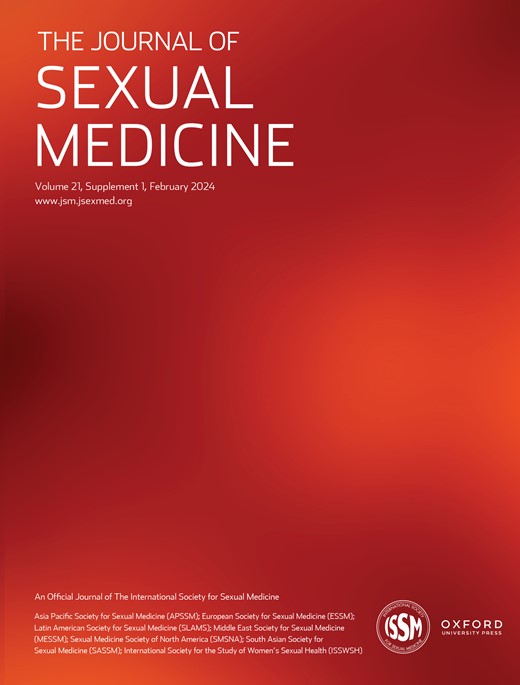
(227) Use of the CNS Agent Bremelanotide in Men with Sexual Dysfunction: Results from a Sexual Medicine Clinic
AbstractIntroduction. Bremelanotide is a centrally acting, cyclic heptapeptide analog of the neuropeptide α-melanocyte-stimulating hormone with elevated af
Abstract
Introduction
Bremelanotide is a centrally acting, cyclic heptapeptide analog of the neuropeptide α-melanocyte-stimulating hormone with elevated affinity for the melanocortin-4 receptor. Bremelanotide modulates dopaminergic pathways involved in sexual desire and arousal. In an fMRI study, compared to placebo, bremelanotide was shown to improve connectivity between the amygdala and the insula during visual sexual stimulation, improve sexual brain processing, enhance cerebellar and supplementary motor area activity, and deactivate the secondary somatosensory cortex. Bremelanotide 1.75 mg/0.3 ml (Vyleesi®) is subcutaneously delivered by a single-use auto-injector which has been shown to result in increased genital blood flow within hours of administration in both men and women. While phase 2 studies were performed in men with erectile dysfunction (ED), bremelanotide is currently FDA-approved as an on-demand treatment for premenopausal women with generalized, acquired hypoactive sexual desire disorder (HSDD). Since its availability in September 2019, providers in our facility have been prescribing bremelanotide to premenopausal women, but off-label to postmenopausal women, and to men diagnosed with ED and other types of sexual dysfunction after undergoing a biopsychosocial evaluation.
Objective
To better understand the use at our sexual medicine clinic of bremelanotide in men, we analyzed on and off-label prescribing patterns and refill rates over a 46-month period in both our male and female patients with various sexual dysfunctions.
Methods
Bremelanotide prescription dispensing data specific to our sexual medicine facility during the period of September 2019 (inception) through June 30, 2023, was compiled. The analysis included the breakdown of prescription dispenses for men, premenopausal women (categorized by age 18-50), and postmenopausal women (categorized by age >50), with further analysis regarding refills and refill rates.
Results
Over the 46-month period, bremelanotide has been dispensed for various sexual dysfunctions: 76 times to premenopausal women, 104 times to postmenopausal women, and 444 times to men in our clinic. For premenopausal women, 29% of these dispenses were refills, for postmenopausal women, 52% of these dispenses were refills, and for men, 65% of these dispenses were refills. Over the last 18 months (January 1, 2022, through June 30, 2023), refill rates have been 47% for premenopausal women (n = 30), 52% for postmenopausal women (n = 29), and 73% for men (n = 219).
Conclusions
The refill rate and prescribing practices of any medication reflect, in part, the safety and efficacy of the treatment in a real-world setting. We observed increasing refill rates of bremelanotide in all patients. Of note, our male patients have particularly high refill rates, implying that bremelanotide, a centrally acting agent, can be used on demand to successfully treat a variety of sexual dysfunctions.









